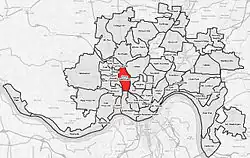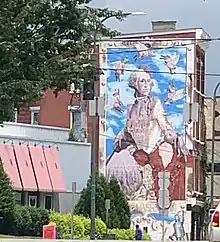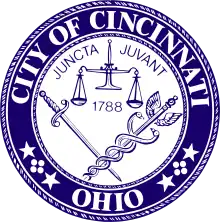Camp Washington, Cincinnati | |
|---|---|
 The Crosley building, original location of WLW studios | |
 Flag | |
 | |
| Country | United States |
| State | Ohio |
| City | Cincinnati |
| Population (2020) | |
| • Total | 1,234 |
| Time zone | UTC-5 (EST) |
| • Summer (DST) | UTC-4 (EDT) |
Camp Washington is one of the 52 neighborhoods of Cincinnati, Ohio. Located next to the Mill Creek, it is north of Queensgate, east of Fairmount, and west of Clifton and University Heights. The community is a crossing of 19th-century homes and industrial space[1] The population was 1,234 at the 2020 census.[2]
History
The first Ohio State Fair was held in Camp Washington in 1850. It had been scheduled the year prior but delayed due to a severe outbreak of cholera.[3]
During the U.S.–Mexican War Camp Washington was an important military location, training 5,536 soldiers who went to war. Camp Washington was annexed to the City of Cincinnati in November, 1869.[4]
The neighborhood is the location of multiple National Register buildings, including the Oesterlein Machine Company-Fashion Frocks, Inc. Complex and the old Cincinnati Workhouse (designed by Samuel Hannaford), which was destroyed and rebuilt to serve as a drug rehabilitation center. The neighborhood has been home to the award-winning Cincinnati chili parlor, Camp Washington Chili for more than 70 years.[5][6][7]
On December 29, 2002, a cow, later named Cincinnati Freedom, escaped a Camp Washington slaughterhouse and eluded capture for eleven days, drawing national attention.[8][9] She was captured in the nearby neighborhood of Clifton and lived out the rest of her days at Farm Sanctuary's New York Shelter in Watkins Glen, New York. The event is memorialized in an outdoor mural on Colerain Avenue, Cincinnati, near the site of the former slaughterhouses.

Demographics
| Year | Pop. | ±% |
|---|---|---|
| 1890 | 10,901 | — |
| 1900 | 8,975 | −17.7% |
| 1910 | 8,682 | −3.3% |
| 1920 | 8,450 | −2.7% |
| 1930 | 9,758 | +15.5% |
| 1940 | 8,805 | −9.8% |
| 1950 | 7,890 | −10.4% |
| 1960 | 6,132 | −22.3% |
| 1970 | 3,117 | −49.2% |
| 1980 | 2,198 | −29.5% |
| 1990 | 1,763 | −19.8% |
| 2000 | 1,506 | −14.6% |
| 2010 | 1,343 | −10.8% |
| 2020 | 1,234 | −8.1% |
2020 census
As of the census of 2020, there were 1,234 people living in the neighborhood. There were 620 housing units. The racial makeup of the neighborhood was 59.2% White, 31.8% Black or African American, 0.1% Native American, 1.7% Asian, 0.0% Pacific Islander, 1.1% from some other race, and 6.2% from two or more races. 2.7% of the population were Hispanic or Latino of any race.[10]
There were 412 households, out of which 43.4% were families. 45.4% of all households were made up of individuals.[10]
9.1% of the neighborhood's population were under the age of 18, 80.0% were 18 to 64, and 10.9% were 65 years of age or older. 51.9% of the population was male and 48.1% was female.[10]
According to the U.S. Census American Community Survey, for the period 2016-2020 the estimated median annual income for a household in the neighborhood was $57,500. About 17.3% of family households were living below the poverty line. About 21.6% had a bachelor's degree or higher.[10]
References
- ↑ Ball, Jennifer (Jun 2007). "Selling Points". Cincinnati Magazine. p. 94. Retrieved 2013-05-06.
- ↑ "Camp Washington Statistical neighborhood approximation". City of Cincinnati. p. 2. Retrieved 27 January 2018.
- ↑ Goodman, Rebecca (2005). This Day in Ohio History. Emmis Books. p. 300. ISBN 9781578601912. Retrieved 21 November 2013.
- ↑ Clarke, S. J. (1912). Cincinnati, the Queen City, 1788-1912, Volume 2. The S. J. Clarke Publishing Company. p. 528. Retrieved 2013-05-20.
- ↑ Grace, Kevin; Tom White (2002). Cincinnati Revealed: A Photographic History of the Queen City. Arcadia Publishing. p. 16. ISBN 0-7385-1955-3.
- ↑ King, Rufus (1903). Ohio: First Fruits of the Ordinance of 1787. Houghton Mifflin. pp. 362.
- ↑ "Camp Washington". CincinnatiHome.com. Archived from the original on 2007-09-27.
- ↑ Miller, Donna. "Cow that escaped Cincinnati slaughterhouse dies peacefully at New York sanctuary". Plain Dealer. Archived from the original on April 10, 2015. Retrieved August 16, 2015.
- ↑ Coston, Susie. "Remembering Cincinnati Freedom: The Legendary Cow Who Escaped a Slaughterhouse". One Green Planet. Retrieved August 16, 2015.
- 1 2 3 4 "Camp Washington 2020 Statistical Neighborhood Approximation" (PDF). City of Cincinnati. Retrieved 11 December 2023.
